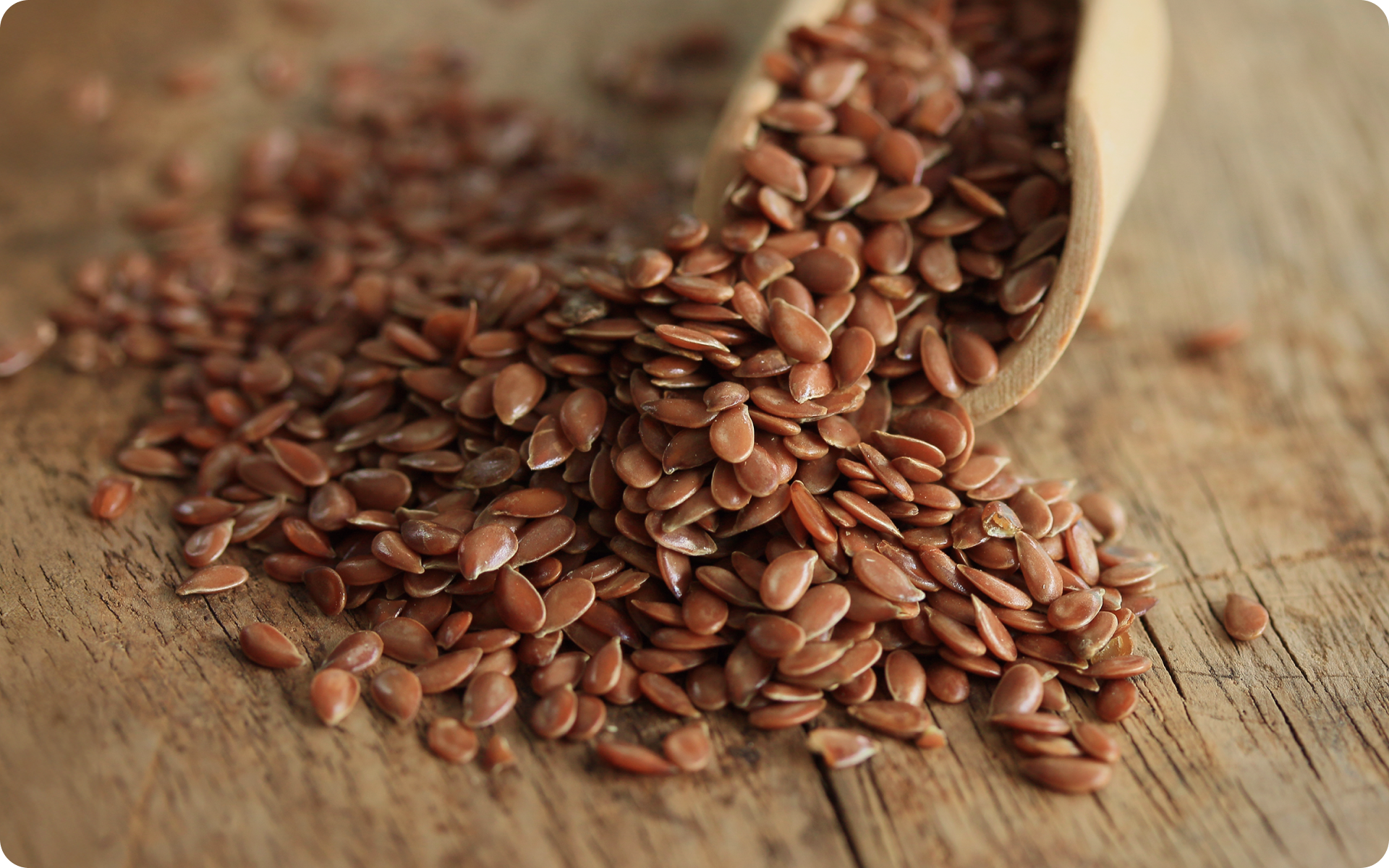Flaxseeds are tiny seeds that come from the flax plant. This plant belongs to the Linaceae family, which also includes the common weed plantain.
The word “flax” is believed to originate from the Latin word “floccus”, which means a wool-like thread, due to the nature of its fibers. These seeds are often referred to as a superfood due to their nutritional profile. This makes them a popular ingredient in many recipes.
Flaxseeds Nutrition Facts
According to the USDA, one tablespoon of ground flaxseeds contains (13):
- Calories: 37
- Protein: 1.3 grams
- Carbs: 2 grams
- Fiber: 1.9 grams
- Total fat: 3 grams
- Saturated fat: 0.3 grams
- Monounsaturated fat: 0.5 grams
- Polyunsaturated fat: 2.0 grams
- Omega-3 fatty acids: 1.6 g
- Vitamin B1: 10% of the DV
- Vitamin B6: 2% of the DV
- Folate: 2% of the DV
- Calcium: 1% of the DV
- Iron: 2% of the DV
- Magnesium: 7% of the DV
- Phosphorus: 4% of the DV
- Potassium: 1% of the DV
Benefits of Flaxseeds
Here are 10 flaxseed health benefits that make them stand out from all other superfoods (10):
Rich in Fiber
Flaxseeds contain high amounts of dietary fiber, which help improve the health of your digestive system. Fiber is essential for regular bowel movements and can relieve uncomfortable symptoms such as constipation, diarrhea, hemorrhoids, and bloating (9).
A study has also shown that people who consume more dietary fiber have a significantly lower risk of developing diverticular disease (2).
Excellent Source of Healthy Fats
Healthy fats play an important role in the health of our bodies. They help us absorb essential nutrients, support cell growth, and protect our organs.
Flaxseeds are an excellent source of healthy fats, particularly omega-3 fatty acids. These fatty acids have been linked to a variety of health benefits such as improving heart health, reducing inflammation, and preventing chronic diseases (14).
BetterMe is your fast-track ticket to a long-lasting weight loss! Tailor your fitness journey and maximize your results with just a couple of swipes!
High in Lignans
Lignans are plant compounds that have powerful antioxidant and anti-inflammatory properties. Flaxseeds are one of the richest sources of lignans. These compounds may reduce your risk of developing certain types of cancer by blocking the effects of estrogen and other cancer-promoting agents (14).
Good Source of Protein
Protein is an important nutrient that plays a crucial role in the growth and repair of our cells. It can also help us feel full after a meal, which is important for weight loss. Flaxseeds contain approximately 1.3 grams of protein per tablespoon, which makes them an excellent source of this nutrient (13).
Some studies have found consuming flaxseed to increase the levels of satiety hormones such as leptin in animals, in addition to producing higher post-meal ratings of fullness in humans (3).
High in Antioxidants
Flaxseeds are rich in antioxidants such as vitamin E and selenium. They help neutralize free radicals that damage cells and cause inflammation, which may ultimately contribute to heart disease and other chronic conditions such as obesity and cancer.
Studies have suggested that flaxseed oil supplementation may reduce some markers of inflammation in people with metabolic syndrome.
Good Source of Magnesium
Flaxseeds are an excellent source of magnesium, which is an essential mineral for the proper functioning of the nervous system. It also plays an important role in the regulation of blood sugar levels and may reduce symptoms of depression, anxiety, insomnia, and migraine headaches.
Magnesium deficiency has been linked to diabetes, cardiovascular disease, osteoporosis, and other chronic conditions (12).
Regulates Blood Sugar Levels
Flaxseeds are a good source of fiber and magnesium, both of which help regulate blood sugar levels. Fiber slows down the absorption of sugar into the bloodstream, while magnesium helps improve insulin sensitivity.
A study has shown that people with type 2 diabetes who consume flaxseed powder have a significant reduction in blood sugar levels and HbA1c (a marker for long-term blood sugar control).
Lower Cholesterol Levels
Flaxseeds contain high amounts of dietary fiber and omega-3 fatty acids, both of which have been found to reduce blood cholesterol levels. Several studies have found that people who included flaxseed in their diet or supplemented it had a significant reduction in their total cholesterol and LDL (bad) cholesterol levels (3).
Promotes Weight Loss
Due to their high dietary fiber content, flaxseeds can help promote weight loss by improving gut health and making you feel full for longer. Fiber also helps improve blood sugar control, which is important for reducing the risk of several chronic diseases associated with obesity.
A systematic review and meta-analysis found participants in controlled trials experienced significant reductions in body weight and waist circumference.
Prevents Constipation
Constipation is a common problem that affects people of all ages. It can be caused by a variety of factors, including a low-fiber diet, dehydration, and lack of exercise. Flaxseeds are an excellent source of fiber, which can help relieve constipation and other digestive problems (3).
Read more: Kalonji Seeds For Weight Loss: How Practical Are These So-Called Magic-Seeds in Weight Loss?
How to Use Flaxseeds as an Ingredient
Flaxseeds or flaxseed oil can be added to many common foods. Try the following:
- Drizzling flaxseed oil on a salad as a dressing
- Adding ground flaxseeds to water and drinking daily
- Adding flaxseeds to soups and stews
- Mixing flaxseed meal with fruit smoothies
- Mixing flaxseeds in yogurt
- Adding them to water as an egg substitute
- Adding them to meat patties
- Adding ground flaxseed to baked goods
- Sneaking them into mashed potatoes by blending the seeds in a blender
Tips for Adding Flaxseeds to Your Diet
Here are some tips for getting the many health benefits of these seeds:
Consume Ground Flaxseeds Rather Than Whole
Ground flaxseeds are more easily digested than whole seeds. They also offer the same benefits as whole flaxseeds, including high amounts of fiber, heart-healthy omega-3 fatty acids, and cholesterol-lowering phytochemicals (1).
Flaxseed Oil Has a Very Strong Flavor
Flaxseed oil is pale yellow in color and has a strong nutty flavor that may not appeal to everyone. You can mix it with soy or walnut oil before you add it to foods for an improved taste.
Grinding Flaxseeds Is the Key to Unlocking Their Nutrients
In order for flaxseeds to offer their full health benefits, it’s helpful for them to be ground up or “broken”. Whole seeds can pass through your digestive system mostly intact and without releasing their nutrients.
In order to get the most from these seeds, you need a powerful high-speed blender or spice/coffee grinder that can break open the seeds and release the lignans inside. Your body then absorbs these phytonutrients much more easily than it would with whole flaxseeds.
The Nutrients in Flaxseed Oil Are Heat Sensitive
Flaxseed oil is heat sensitive with a low smoke point and should not be cooked at high temperatures. It’s best to add it to foods after they’ve been cooked or use it as a cold dressing.
Store Flaxseeds in the Refrigerator or Freezer
Once flaxseeds are ground, they spoil quickly and can go rancid. Therefore, it’s best to store them in the refrigerator or freezer.
Mix Them with Other Ingredients for Added Health Benefits
Flaxseeds don’t have to be consumed on their own to offer health benefits. You can mix them with other ingredients to create healthful dishes that are both delicious and nutritious. For example, try adding them to a bowl of oatmeal, a green salad, or a smoothie.
If you’ve mustered up the courage to crush your weight loss goal, let Betterme take the sting out of this demanding process. Our app will help you restructure your habits, remold your life and crank up your fitness results!
Does Flaxseed Have Side Effects?
Dry flaxseeds are generally well-tolerated, and allergies are rare. However, it’s recommended to drink plenty of water when eating these seeds as they’re high in fiber. Some of the health effects of consuming too much of these seeds include:
Impaired Thyroid Function
Flaxseeds, particularly unripe ones, naturally contain plant compounds that are called cyanogenic glycosides. These compounds can interact with other compounds in your body to form thiocyanates that interfere with iodine uptake by your thyroid glands (7).
Moderate portions are highly unlikely to cause any adverse effects in healthy individuals, and cyanogenic glycosides are easily destroyed by various processing methods or cooking. However, those who have thyroid problems should consider avoiding excessive amounts of flaxseeds and everyone should avoid raw or unripe flaxseeds.
Poor Absorption of Minerals
The overconsumption of flaxseeds can also lead to poor absorption of minerals from food. This is due to the high levels of phytic acid in flaxseeds binding to minerals such as zinc, iron, and calcium, which makes them unavailable for absorption.
Phytic acid is a naturally occurring compound that can also be found in other plant foods such as grains, legumes, and nuts (11). Soaking or sprouting flaxseed may help reduce the phytic acid content. Eating a moderate amount of flaxseed as part of a nutritious and varied diet should not have a significant impact on most people’s ability to absorb enough nutrients. If you have a deficiency or trouble getting enough of a certain nutrient in your diet, you should talk to your healthcare provider for individualized advice.
Constipation and Diarrhea
Consuming large amounts of flaxseeds can cause constipation and/or diarrhea in some people. If this occurs, you should reduce your intake and drink plenty of fluids (4). You should always drink plenty of fluids when eating flaxseed or other high-fiber foods and supplements. You may also want to increase your fiber intake gradually if you’re not used to it.
Phytoestrogens Risks During Pregnancy
Flaxseeds and flaxseed oil naturally contain compounds called phytoestrogens that can mimic estrogen in the body. Although these plant-based estrogens are much weaker than the estrogen that is found in birth control pills, experts still recommend caution during pregnancy.
There is some concern that they may disrupt hormonal balance and increase the risk of lower birth weight, and there is not enough evidence to know for certain the effects they may have during pregnancy (6).
Talk to your OB/GYN about foods to avoid or limit during pregnancy, and always discuss any diet changes or supplements you’re considering with your doctor before starting them.
Blood Thinning Effects
Flaxseeds and their oil naturally contain omega-3 fatty acids that can act as blood thinners when consumed in large doses. It’s still unknown if this effect is significant enough to cause problems such as excessive bleeding, but it’s best to be cautious by avoiding flaxseeds and flaxseed oil if you’re already on blood-thinning medication or have a bleeding disorder (5). Talk to your healthcare provider for individualized advice.
Read more: Poppy Seeds Nutrition Facts: Benefits, Side Effects And More
FAQs
Is it OK to take flaxseed every day?
Taking flaxseed every day is safe for most people, depending on which form and how much you consume, in whole seeds, ground seeds, oil, and supplements.
Whole seeds contain a hard outer shell that makes them difficult to digest. The fibrous shell can cause digestive discomfort and prevent the body from fully absorbing the nutrients.
A sudden intake of fiber in large quantities can also lead to bloating, gas, and constipation. Therefore, consuming whole flaxseeds every day may not be ideal, at least immediately.
Ground seeds are easier to digest and can be incorporated into smoothies, oatmeal, or baked goods. You may find them sold as flaxseed meal or ground flaxseed. This form of flaxseed is a convenient option for everyday use and helps with nutrient absorption.
However, flaxseed oil contains only fat and no fiber. While it does offer omega-3 fatty acids, it lacks the fiber and other nutrients that are found in whole or ground flaxseeds. Therefore, consuming flaxseed oil every day may not have the same health benefits as consuming whole or ground seeds.
Furthermore, exposure to heat and light can cause the oil to become rancid quickly, which reduces its nutritional value.
Supplements are another option for consuming flaxseed every day. They may come in the form of capsules or oils and offer a concentrated dose of omega-3 fatty acids. They’re ideal for those who cannot consume whole or ground seeds regularly or who don’t enjoy the taste.
However, as with any supplement, you should consult a healthcare professional before adding them to your daily routine. Also, check the dosage and quality of the product before consuming it.
In our Quinoa Side Effects article, we highlight similar points about moderation and consulting a healthcare professional before adding any new food to your daily routine.
Who should not eat flaxseeds?
Anyone who has an allergy to flaxseed or its related plants should avoid consuming it. Plants such as flaxseed, linseed, and chia are all part of the same family and may cause an allergic reaction.
Some common symptoms of a flaxseed allergy include hives, itchiness, swelling, and difficulty breathing. If you experience any of these symptoms after consuming flaxseed or products containing it, you should seek immediate medical attention.
In addition, pregnant women should be cautious when consuming flaxseed. While small amounts are generally considered safe, large doses of flaxseed may have mild hormonal effects and potentially lead to preterm labor. It is always best to consult a healthcare professional before you make any changes to your diet during pregnancy.
If you have digestive issues such as diverticulitis, ulcerative colitis, or irritable bowel syndrome, it’s best to avoid consuming flaxseed during a flare-up. The high fiber content in flaxseed can worsen these conditions and cause discomfort (8).
People who are taking certain medications should also be careful when taking flaxseed every day.
Flaxseed may interact with blood thinners, diabetes medication, and hormonal birth control. It’s important to discuss with your healthcare provider before you add flaxseed to your daily routine if you’re taking any of these medications.
Can I eat flaxseeds raw?
Flaxseeds should not be eaten raw and it is recommended to consume them in their ground form. While whole flaxseeds are difficult for the body to digest, grinding them breaks down the outer shell and allows for better nutrient absorption.
In addition, raw or unripe flaxseeds may contain potentially toxic compounds.
You can easily grind flaxseeds at home using a coffee or spice grinder, blender, or food processor. Store ground flaxseed in an airtight container in the refrigerator or freezer to prevent it from going rancid.
Check out our Sunflower Seeds Benefits piece for more information on the benefits of consuming seeds regularly.
How should I eat flaxseeds for weight loss?
The best ways to eat flaxseeds for weight loss are;
- Add them to your smoothies: Flaxseeds add an extra boost of nutrients and fiber to your morning smoothie. Simply grind them up before adding them in.
- Sprinkle on salads or yogurt: Adding a tablespoon of flaxseeds on top of your salad or yogurt is an easy way to incorporate them into your meals. They add bulk to your food, which makes you feel fuller for longer.
- Mix into oatmeal or overnight oats: Adding flaxseeds to your oatmeal or overnight oats is a great way to add extra nutrients and texture. The heat from the oatmeal will help release some of the beneficial oils in flaxseeds.
- Use as an egg substitute in recipes: Flaxseeds can be used as an egg substitute in baking recipes. Just mix 1 tablespoon of ground flaxseeds with 3 tablespoons of water and allow it to sit for a few minutes to thicken before using in the recipe.
- Make flaxseed crackers: Mix ground flaxseeds with your favorite herbs and spices, roll out the dough thinly, and bake until crispy. These make a great healthy snack option.
Check out our piece on Sesame Seeds Facts to learn more about similar healthy seed options for your meals.
The Bottom Line
Flaxseeds are a nutrient powerhouse that offer a variety of health benefits. They are particularly high in fiber, lignans, and omega-3 fatty acids. Although they have some potential side effects when consumed in large amounts, these seeds are generally well-tolerated and safe for most people to eat. So go ahead and add them to your next meal!
DISCLAIMER:
This article is intended for general informational purposes only and does not serve to address individual circumstances. It is not a substitute for professional advice or help and should not be relied on for making any kind of decision-making. Any action taken as a direct or indirect result of the information in this article is entirely at your own risk and is your sole responsibility.
BetterMe, its content staff, and its medical advisors accept no responsibility for inaccuracies, errors, misstatements, inconsistencies, or omissions and specifically disclaim any liability, loss or risk, personal, professional or otherwise, which may be incurred as a consequence, directly or indirectly, of the use and/or application of any content.
You should always seek the advice of your physician or other qualified health provider with any questions you may have regarding a medical condition or your specific situation. Never disregard professional medical advice or delay seeking it because of BetterMe content. If you suspect or think you may have a medical emergency, call your doctor.
SOURCES
- Are Flaxseeds All That? (2023, nytimes.com)
- Dietary fibre intake and the risk of diverticular disease: a systematic review and meta-analysis of prospective studies (2019, nih.gov)
- Flax and flaxseed oil: an ancient medicine & modern functional food (2014, nih.gov)
- Flaxseed: Uses, Side Effects, Dose, Health Benefits, Precautions & Warnings (2021,emedicinehealth.com)
- FLAXSEED (n.d., webmd.com)
- Flaxseed and Flaxseed Oil (2020, nih.gov)
- Flaxseed-a potential functional food source (2014, nih.gov)
- Flax Uses, Side Effects & Warnings (2023, drugs.com)
- Health benefits of dietary fiber (2009, pubmed.gov)
- Health Benefits of Flaxseed – Nutrition (2023, health.com)
- Reduction of phytic acid and enhancement of bioavailable micronutrients in food grains (2013, nih.gov)
- Review: Subclinical magnesium deficiency: a principal driver of cardiovascular disease and a public health crisis (2018, nih.gov)
- Seeds, flaxseed (2019,usda.gov)
- The benefits of flaxseed (2016, usda.gov)











